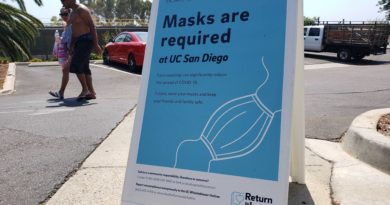COVID-19 and Brexit disruption offer chance to build stronger system, says new U.K. research funding head | Science

Ottoline Leyser, the second director of UK Research and Innovation, says she’s prioritizing diversity at the funding agency.
Sainsbury Laboratory Cambridge University
On 29 June, Ottoline Leyser, a plant biologist from the University of Cambridge, started her new role as the director of the United Kingdom’s main research funding agency, UK Research and Innovation (UKRI). She is only the second director of the young agency; her predecessor, Mark Walport, oversaw the union of discipline-specific research councils into UKRI in 2018.
Leyser steps into the job at a turbulent time. The U.K. government has big plans for science, recently announcing plans for new infrastructure, immigration support, and an expanded budget. But with the COVID-19 pandemic upending research careers, and Brexit challenging the internationality of U.K. science, there are challenges as well as opportunities afoot.
ScienceInsider interviewed Leyser about her first weeks on the job and her plans for U.K. research funding and culture. The interview has been edited for brevity and clarity.
Q: Why would you want to take this job, just as the nation faces both the COVID-19 pandemic and Brexit?
A: Well, I’m a very optimistic person. All of these instabilities in the system are indeed extremely unsettling and very challenging but they also, in my view, create opportunities. When something is this destabilized there is an opportunity to put it back together in a much more robust form.
Q: In its budget announcement in March, the U.K. government promised to more than double its annual research funding allocation, reaching £22 billion by 2025. How much of an increase will UKRI see, and how will it distribute it?
A: The short answer to that is we don’t know yet. We’re in the middle of the spending review process where, right across government, everybody is bidding in for their funding. I would consider it a major win if we were able proportionately to double our budget in the same way that the overall budget is doubling. But having said that, there are many pressing calls on that money. I’m very keen to move away from the notion of a zero-sum game. We’ve got to build a system that works holistically so that investing in this part of the system benefits the whole system.
Q: As part of the budget increase, the government has announced plans to create a high-risk, high-reward funding agency modeled on the Advanced Research Projects Agency (ARPA) In the United States, with an initial budget of £800 million. Who is currently working on setting it up?
A: There is a huge amount of conversation around ARPA. The emphasis is on experimental funding models, and I’m quite excited about that. UKRI has this extraordinary breadth and depth across the whole system and a responsibility to make the whole system work. When you’ve got that core responsibility, it’s harder to do the wild experimental things. And so the notion of an agency whose job it is to do that is very attractive.
Q: There is debate over where this ARPA might be located bureaucratically—within UKRI; within your parent organization, the Department for Business, Energy and Industrial Strategy; or a completely independent agency, reporting directly to Prime Minister Boris Johnson’s office. What do you think should happen?
A: I think that there is a strong argument for an independent organization.
Q: The European Council recently announced a 7-year budget deal that would set aside €81 billion for Horizon Europe, the EU research funding program. Many U.K. researchers are hoping the United Kingdom “associates” and agrees to pay into Horizon Europe after Brexit, giving U.K. researchers access to this pot of funding. What are your hopes and expectations for association to Horizon Europe?
A: It’s clear that there is a huge range of benefits that we would get out from associating with the Horizon programs, and there’s an awful lot of work going on to try to make that happen. The key question is the price tag. There’s no problem with a so-called juste retour basis where we put in what we get out; there’s no problem with a juste retour basis plus something. The trouble is that the current something that we’re being asked for is too high. The issues are going to be whether we can negotiate that down to a level that everybody is comfortable with.
Q: UKRI recently announced funding for six research projects to investigate the disproportionate death rate from COVID-19 among people from Black, Asian, and minority ethnic (BAME) backgrounds. How do you respond to the criticism that none of the principal investigators for these projects were Black?
A: I think it’s really important that we work hard to address the serious underrepresentation of the BAME community, and particularly the Black community in the research and innovation system in the U.K. That’s a really long-term goal that is very much part of this broader diversity agenda that I think is an absolute priority. I don’t think we will be able to build the really vibrant and creative research innovation system that we need unless it is truly open to the diversity of talent in the country. That is a major priority for me.
Q: In February, UKRI announced that it would establish its new national research integrity committee by summer this year. Has the committee been formed?
A: We have appointed an interim chair [Helen Munn]. This is a really important area. There’s a lot of emphasis on top-down mechanisms to stop bad things happening. We would much rather those are deeply tied with bottom-up mechanisms to create the kind of environment where they don’t happen. Nobody wants to do low integrity research. We need to create incentives structures in the system that support the really good behaviors everybody wants, because otherwise, we won’t attract the right people into the system. They’ll look at the system and say, “That’s not somewhere I want to work.”




